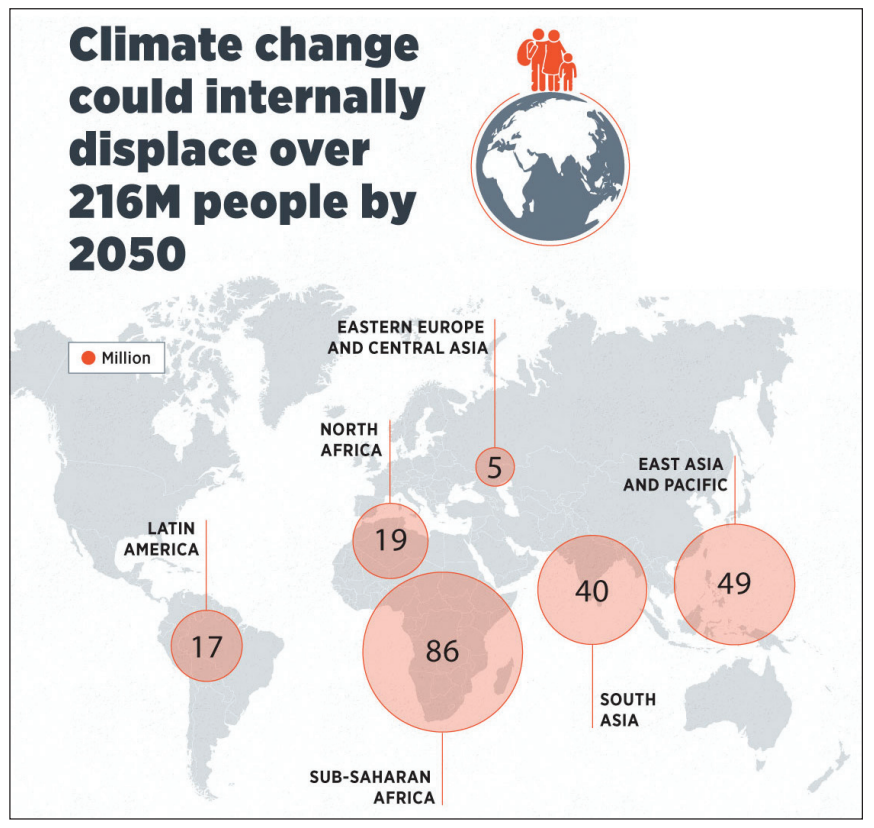Introduction
Today, one of the most important issues on the international agenda is climate change. The global average temperature has increased by an average of 1.2 degrees Celsius (oC) since the Industrial Revolution.1 The aim of the Paris Agreement, which was accepted at the 21st Conference of the Parties (COP21), held in 2015 within the scope of the United Nations Framework Convention on Climate Change (UNFCCC), is to avoid dangerous climate change by limiting global warming to well below 2°C and pursuing efforts to limit it to 1.5°C.2 The Paris Agreement recognizes climate change as both an emergency and, in many cases, an irreversible threat to our planet.3 Due to the effects of climate change, heatwaves, drought, and desertification, floods due to excessive precipitation, large forest fires, and storms have increased in number, frequency, and severity. The 5th Assessment Report (AR5) of the Intergovernmental Panel on Climate Change (IPCC) states that global inequalities will increase, and new areas of poverty will emerge because of climate change. The report reveals that as disasters increase due to climate change, livelihoods will decrease, water, food, and energy security problems will intensify and instability in these areas will increase.4
The last six years have been the warmest on record.5 The UN emphasizes that catastrophic disasters have increased significantly in the last 20 years. This increase is especially noticeable in climate-related disasters, which constitute approximately 91 percent of all disasters worldwide. In the Human Cost of Disasters Report published in 2020, the UN states that 7,348 disasters occurred between 2000 and 2019; they cost the lives of 1.23 million people, affected 4.2 billion people, and caused damage in the amount of $2.97 trillion. These findings indicate that climate change is now a threat multiplier and has become a security issue for many countries.6
In the Global Risks Report published by the World Economic Forum (WEF) in 2021, extreme weather events, failure in climate action, and damage to the environment are among the leading risks at the global level.7 The current COVID-19 should be considered as a warning for humanity to reconsider its relationship with nature. Moreover, the pandemic has revealed that humanity is unprepared for crises. According to World Bank studies, an additional 115 million people were pushed into extreme poverty in 2020.8 For all these reasons, urgent action should be taken regarding the climate crisis.
Through mechanisms such as the Nationally Determined Contributions (NDC), developed under the Paris Agreement, countries’ commitments are being made within the scope of greenhouse gas (GHG) mitigation in the fight against the climate crisis, and adaptation measures are being implemented to counter the negative effects of climate change. However, the results obtained are not on the desired scale. In the Physical Science Basis Report of AR6 Working Group I (WG-I), published in August 2021 by the IPCC before UNFCCC COP26, it was emphasized that the negative consequences of climate change will be faster, more intense, and more severe in the coming period. According to all of the climate scenarios studied in the IPCC Report, it is emphasized that the global surface temperature increase will continue until the middle of the century and unless carbon dioxide (CO2) and other GHG emissions are seriously reduced; the 1.5oC and 2oC limiting targets of global temperature increase will be exceeded in the 21st century and the warming level will reach 2.7oC as it can be seen in Figure 1. The report emphasizes that the effects of climate change will be more intense in cities, which host 56 percent of the global population today, and that floods, sea-level rise, and urban heat islands will intensify there. The report states that intense changes will occur in the water cycle due to climate change, meaning heavy rainfall for some regions and intense drought for others.9 UN Secretary-General António Guterres described the report as a red alert for humanity.10
Figure 1. Global Warming under Different Scenarios and National Commitments
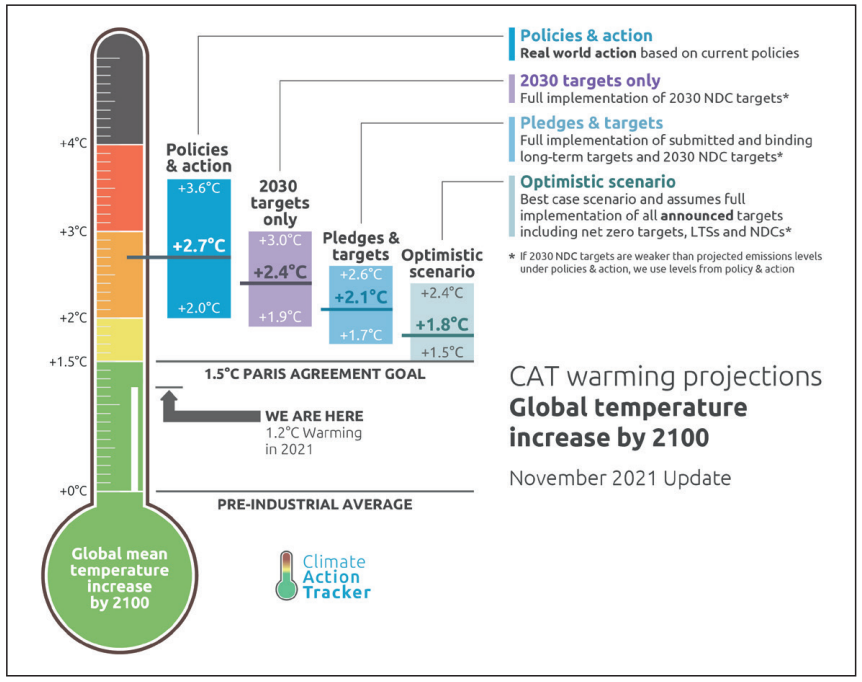 Source: Glasgow’s 2030 Credibility Gap: Net Zero’s Lip Service to Climate Action11
Source: Glasgow’s 2030 Credibility Gap: Net Zero’s Lip Service to Climate Action11
In October 2021, prior to UNFCCC COP26, the results of the evaluation made by the UN on NDCs in the context of countries’ GHG mitigation and climate change adaptation commitments were published within the scope of the NDC Synthesis Report. In the evaluation, made in line with the 165 current NDCs presented by the countries in the report, it was emphasized that more ambitious targets should be announced by all countries to cope with the negative consequences of the climate crisis and that cooperation should be increased in this context.12
These and other effects of the climate crisis increase threats to livelihood and survival and have brought the concept of climate security to the global agenda. The potential for conflicts sparked by natural resource crises and mass migration movements that will arise as a result of both extreme climate events in the short term and slow-onset events in the medium and long term will only increase as climate change threatens national security and state development efforts.13
Disasters caused by extreme weather events related to climate change and the struggles and conflicts that arise in the context of the economic, social, and environmental consequences of climate change trigger climate migration. In the context of the relationship between climate change and migration, approaches are being discussed in two, related groups. The first group of approaches deals with migration together with climate and environmental factors as well as social, political, and economic structures. It focuses on the essential task of developing strategies to cope with the problem of migration linked to climate change and to adapt to the effects of climate change. The second group of approaches addresses the legal and political dimensions of migration, particularly the protection status to be provided to immigrants and refugees, and the duties and responsibilities of the international community.14
The pandemic has revealed that humanity is unprepared for crises. According to World Bank studies, an additional 115 million people were pushed into extreme poverty in 2020
The Impacts, Adaptation and Vulnerability Report of AR6 Working Group II (WG-II), published in February 2022 by the IPCC, states that regions and communities with development constraints are particularly sensitive to climate impacts: Central and East Africa, Southern Asia, Central, and South America, Small Island Developing States, and the Arctic are noted as global hot spots. The report emphasizes that these regions have higher vulnerabilities in terms of access to basic services and resources, proximity to violent conflicts, and prevalence of climate-sensitive livelihoods.15 Indeed, climate migration has already begun, especially from developing countries that do not have sufficient capacity to combat climate change. In 2017, 68.5 million people were forcibly displaced. Of these, 22.5-24 million migrations were due to sudden, extreme weather events. In 2019 alone, 33.4 million people had to migrate due to disasters and conflicts.16 According to the International Organization for Migration (IOM) World Migration Report 2022, the number of international migrants reached 281 million people in 2020; that is, 3.6 percent of the global population has had to migrate.17 The UN High Commissioner for Refugees (UNHCR) has predicted that the number of people to be displaced due to climate change will vary between 250 million and 1 billion people between 2016-2050.18 In this context, it is necessary to consider not only international migration but also migration within countries. According to IOM figures, in total, 763 million people immigrate within their own countries.19 Therefore, today, it is essential to evaluate migration and climate security problems in relation to climate change and to make them a high priority.
In line with these principles, the aim of this article is to evaluate the relationship between climate change and migration and to examine the consequences that may arise in the context of climate security in the world and in Turkey. The study is divided into five parts: First, a conceptual framework is put forward in relation to climate change, security, and migration. Second, the relationship between global climate change and migration is examined. Next, the concept of climate security is discussed in relation to climate change. Then, the relationship between climate change, migration, and international law is evaluated. Finally, the phenomenon of migration, which is an important agenda item for Turkey, as it is globally, is evaluated in the context of Turkey’s unique geographical location. In the conclusion, the findings obtained from all these sections are evaluated together.
Conceptual Framework
In the UNFCCC, one of the important outputs of the UN Conference on Environment and Development held in 1992, climate change is defined as “a change in climate which is attributed directly or indirectly to human activity that alters the composition of the global atmosphere and which is in addition to natural climate variability observed over comparable periods of time.”20 Climate change is defined by the IPCC as climatic changes that occur over time as a result of natural changes or human activities. Since the main cause of climate change in the 21st century is human activities, it is also referred to as “anthropogenic (human-induced)” climate change in IPCC reports.21 Within the scope of combating climate change and risk management, different policies regarding adaptation to climate change and GHG mitigation have been determined by individual states.22
In the fight against climate change, actions such as reducing the amount of GHG emissions (e.g., by reducing the use of fossil fuels) or increasing the number of sink areas such as forests are carried out in line with the Paris Agreement’s target of keeping the global average temperature below 2oC. Therefore, in UNFCCC the stated aim of the mitigation actions is “to balance GHG emissions at a level where ecosystems can adapt naturally to climate change, food security is ensured, and sustainable economic development is assured.”23
Adaptation to climate change involves making adjustments in human systems to increase resilience to the effects of climate change and to benefit from these effects where possible.24 Adaptation to the effects of climate change can occur autonomously, in a planned way by state and non-state initiatives, or naturally. While private actors mobilized by climate change carry out autonomous actions, public, and/or private actors carry out planned actions, and policies are developed. Natural adaptation actions are taken by the ecosystem itself as a result of climate change. Climate change adaptation actions are of limited nature; however, the increase in climate-related risks and levels of vulnerability can be exacerbated by maladaptation.25
Climate security includes risks and threats that endanger the lives of people, the continuity of ecosystems, and the welfare of countries
The dimensions of climate change, which generate conflict and security risks and cause damaging social and economic effects due to their impact on natural resources, can reach such a level under certain conditions that measures such as adaptation to the effects of climate change and GHG mitigation are insufficient. If the harms caused by human-induced climate change cannot be avoided through adaptation and mitigation measures, and if it is not possible to adapt to future effects due to insufficient resources, loss and damage will inevitably occur. Loss and damage can be caused by sudden shocks and disasters due to climate change, as well as events such as desertification, increasing temperatures, loss of biodiversity, melting of glaciers, acidification of the oceans, and land degradation, which are considered slow-onset events. The effects of loss and damage (Figure 2) are seen in human life, economic conditions, physical assets, the environment, and social structures.26 In the face of this loss and damage, it is inevitable that the consequences of the negative effects of climate change will be a factor that increases conflicts. The relationship between emerging conflicts and climate change has given rise to the concept of climate security.27
Figure 2. Loss and Damage due to the Effects of Climate Change
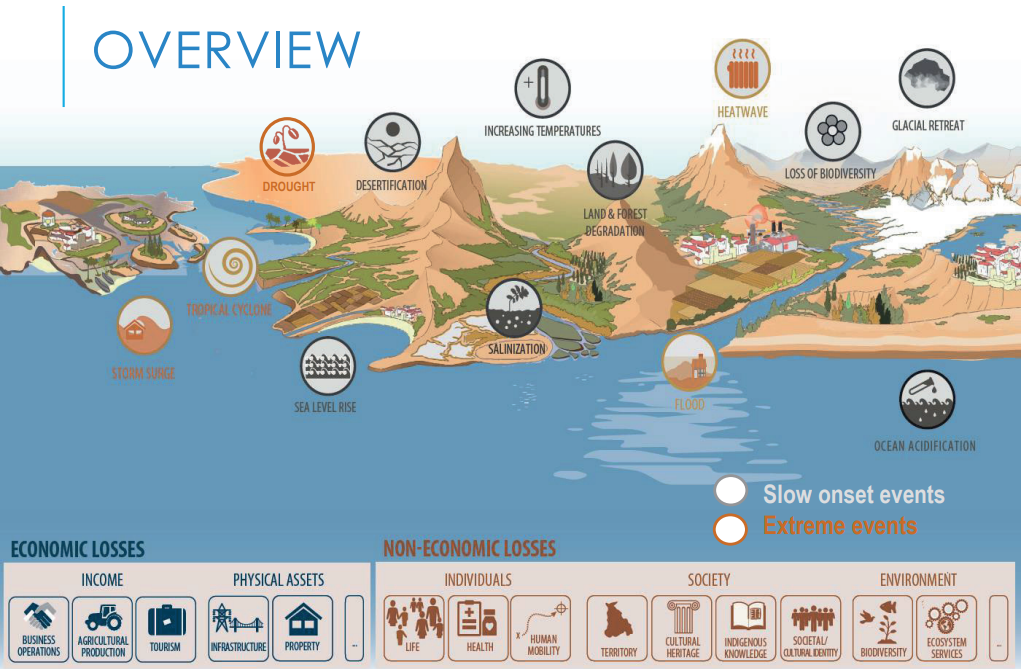 Source: Loss and Damage Online Guide, UNFCCC28
Source: Loss and Damage Online Guide, UNFCCC28
Today, the concept of climate security is widely used in the context of problems and conflicts that arise due to natural resource crises worsened by climate change and that have negative consequences in the context of water and food security. The World Food Program (WFP) describes food as the path to peace and sees the impact of climate change on food security as one of the most important factors that initiate and increase conflicts between societies. Violence and conflict push people to migrate to new places without having time to adapt to the climatic conditions in their current homes. Extreme climatic conditions trigger chronic poverty and hunger, together with violence and conflict. It is thus crucially important for the future of nations to develop approaches that do not leave anyone behind.29
Climate security includes risks and threats that endanger the lives of people, the continuity of ecosystems, and the welfare of countries. In addition, it is a concept that points to the policies and actions of GHG mitigation and climate change adaptation, which should be put forward in order to reduce the effects of climate change and encourage a paradigm shift in security and policy-development processes.30
Although the terms climate migrant and climate refugee are often used interchangeably, they are essentially different concepts. Climate refugees are those who flee from torture and conflicts to which they are exposed due to race, religion, nationality, membership in a certain social group, or political opinion; they aim to reach a safe zone by crossing national borders, according to the UNHCR. In this respect, the IOM characterizes them as ‘displaced persons.’31 In the ‘Glossary on Migration’ prepared by the IOM in 2019, the concept of climate migration is defined as “the movement of a person or groups of persons who, mainly for reasons of sudden or progressive change in the environment due to climate change, are obliged to leave their habitual place of residence, or choose to do so, either temporarily or permanently, within a State or across an international border.”32 The term immigrant is an umbrella term to describe both climate migrants and climate refugees. Due to the negative consequences of climate change, the number of displacements and climate migrations is increasing day by day.33 The distribution of international migrants, which reached 281 million in 2020, is presented in Figure 3.
Figure 3. Distribution of International Immigrants
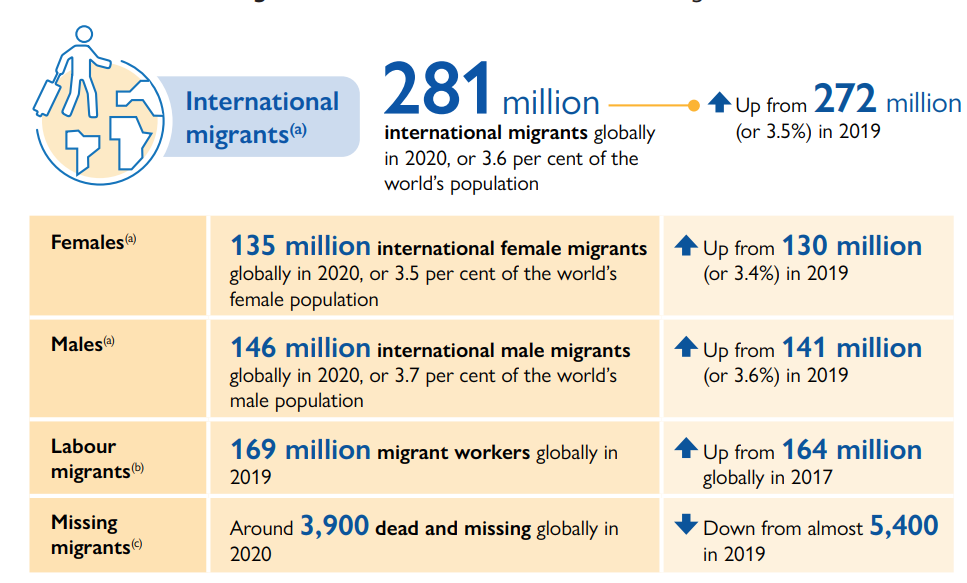 Source: World Migration Report 2022, IOM34
Source: World Migration Report 2022, IOM34
Many changes in the availability and/or accessibility of environmental resources occur due to climate change, and these will continue to increase.35 People migrate because they are vulnerable to the effects of climate change; in this sense, migration can be understood as a means of adapting to climate change.36
Figure 4. Distribution of Displaced People
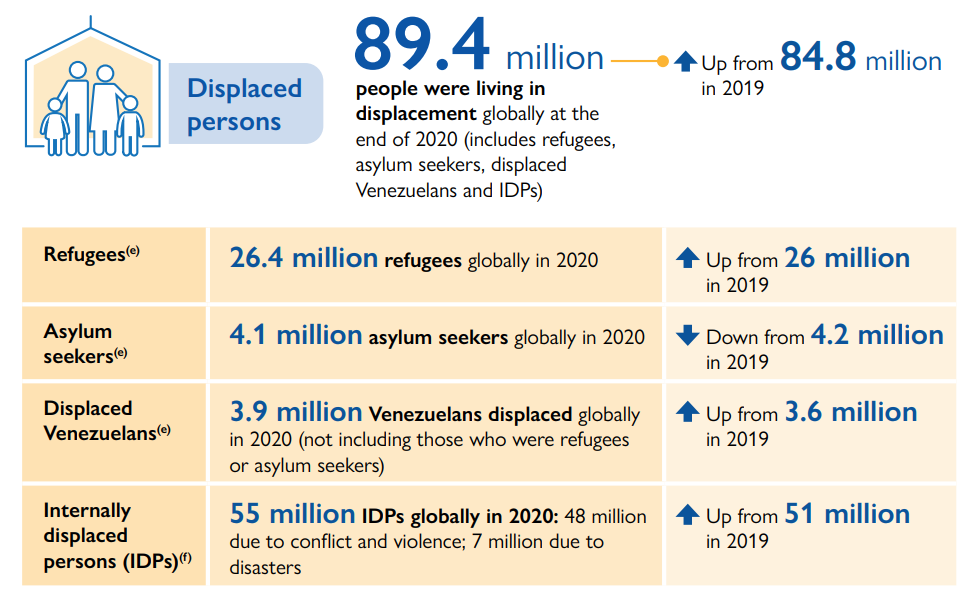 Source: World Migration Report 2022, IOM37
Source: World Migration Report 2022, IOM37
According to Figure 4, the number of people displaced in 2020 had reached 89.4 million. These include refugees, asylum seekers, and 55 million people displaced by conflict and violence, seven million of which were displaced due to disasters.38 It is accepted that the return of refugees to their countries will pose a problem in terms of their life safety.
Refugees are protected by international law according to the 1951 Refugee Convention. Thus, being defined as a refugee is very important and includes certain rights.39 According to the Convention, refugee status is based on the precondition of being persecuted. It should be noted that the Convention’s definition of a refugee does not include persons displaced due to environmental degradation and scarcity of natural resources, including those caused by climate change. Despite the challenges climate change poses, it is very difficult to prove that the damage they cause has a direct effect on fundamental rights and freedoms and to associate it with persecution.
A report published by the IPCC in February 2022, emphasizes that the current effects of climate change are more severe than had been predicted 20 years ago; they affect not only urban and rural populated areas but are being felt from the depths of the ocean to the poles and to the tops of the highest mountains where they have not been seen before. It can be predicted that more migration movements will take place in the upcoming period in places where these effects are occurring more rapidly, more severely, and more widely.
As stated in the current IPCC (2022) report, since the publication of the IPCC 5th Assessment Report in 2014, various studies have determined links between climate change, conflict, and migration, but there is no complete consensus on this issue. The IPCC report stated that the continuation of the urbanization trend in regions exposed to extreme weather events today is an issue that increases the damage as a result of the effects of climate change. Biodiversity loss also increases risks for humans. However, according to the IPCC, the causes of conflicts and migrations that will occur in the short term due to these effects are considered to be mismanaged governance and poor socio-economic conditions, rather than climate change itself.40
The Relationship between Climate Change and Migration
As emphasized in the IPCC reports, developing countries are those most affected by the consequences of climate change. The population growth rate in these countries is quite high and their capacity to combat and adapt to climate change is very low.41 Moreover, the livelihoods of citizens of these countries are mostly based on nature-related sectors. The IPCC’s Special Report on Global Warming of 1.5oC noted that communities whose economic activities are based on agriculture have had to migrate from rural to urban areas due to the increase in temperature and water stress. Although the issue of combating the effects of climate change and developing adaptation capacity is emphasized both in the UNFCCC and the Paris Agreement, the fact that developed countries do not fulfill their commitments to provide financial support complicates the process. According to the IPCC reports, the people of developing countries reside in the regions of the world that are most affected by climate-related disasters and thus suffer disproportionately from the climate crisis.42
People migrate because they are vulnerable to the effects of climate change; in this sense, migration can be understood as a means of adapting to climate change
According to the Global Climate Risk Index 2021 results, eight of the ten countries most affected by climate change-related extreme weather events in 2019 are low-income countries (Table 1). Half of them are in the Least Developed Countries category. Mozambique, Zimbabwe, and the Bahamas were the countries most affected by disasters due to extreme climate events in 2019. In the evaluation made between 2000-2019, Puerto Rico, Myanmar, and Haiti were the most affected countries. Storms, heavy rains, floods, and landslides exacerbated by climate change were the main causes of loss, with 475,000 deaths and financial losses of approximately $2.56 trillion.43
Table 1. Ten Countries Most Affected by Extreme Weather Events due to Climate Change in 2019
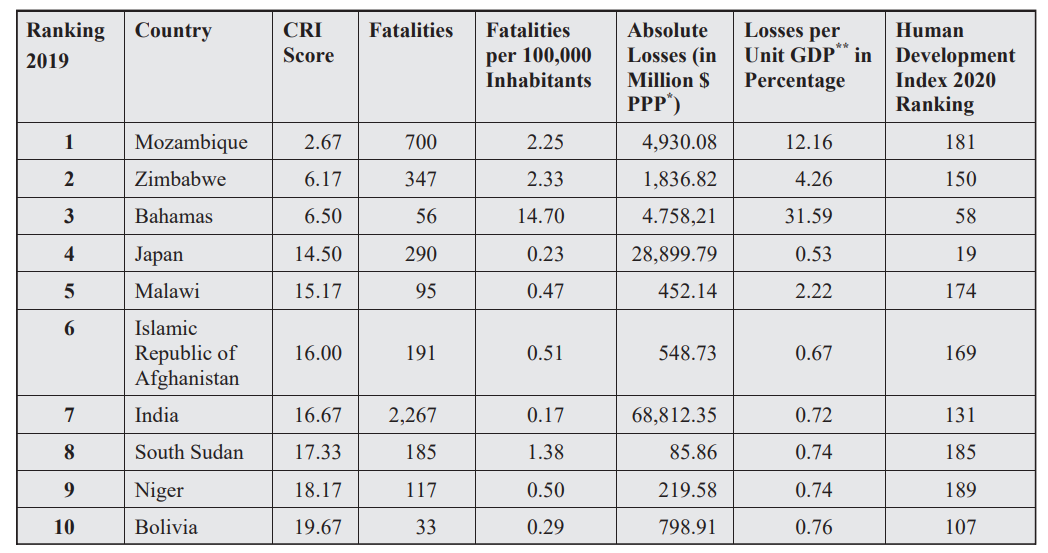 *PPP: Purchasing Power Parties, **GDP: Gross Domestic Product.
*PPP: Purchasing Power Parties, **GDP: Gross Domestic Product.
Source: Global Climate Risk Index 202144
Due to the negative effects of climate change, people migrate within their own countries and internationally, or become refugees. Currently, the Small Island States and many other sensitive societies are experiencing the negative effects of climate change and climate security problems.45 Indeed, the UN Environment Program (UNEP) warns that the existence of the Small Island States such as Kiribati, Maldives, the Marshall Islands, and Tuvalu are in jeopardy due to the negative effects of climate change (Figure 5).
Figure 5. Economic, Natural, and Climate Change-Related Factors that Increase
the Risk of Displacement in the Small Island States
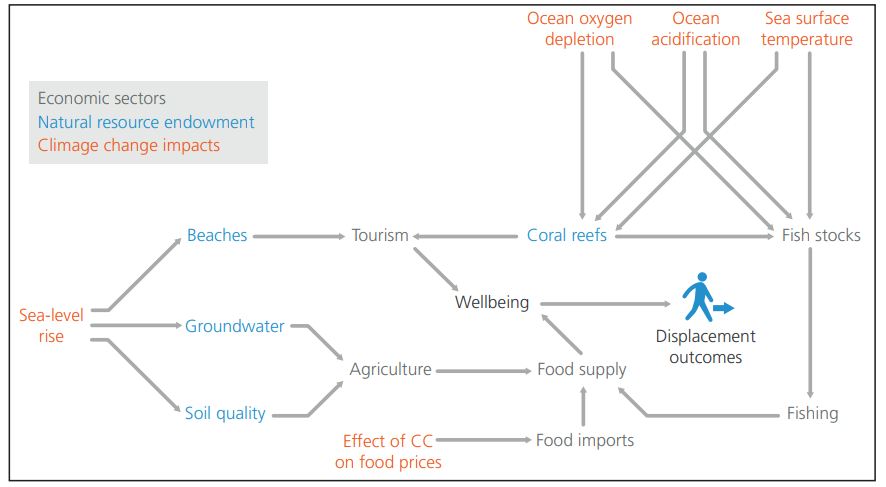 Source: No Matter of Choice: Displacement in a Changing Climate46
Source: No Matter of Choice: Displacement in a Changing Climate46
Although migrations occur for many different reasons, the factors that cause migration can be broadly grouped as socio-economic, political, or environmental. In the context of economic structure, income and unemployment are important factors. Political reasons include threats to security and freedom that can lead to conflicts. Today, environmental problems are increasingly associated with displacement and migration. Studies carried out by the World Bank reveal that 216 million people who are vulnerable to the effects of climate change will have to migrate within Sub-Saharan Africa, South Asia, and Latin America in 2050 (Figure 6).47
Figure 6. World Bank’s 2050 Projection of Internal Migration Distribution in 6 Regions
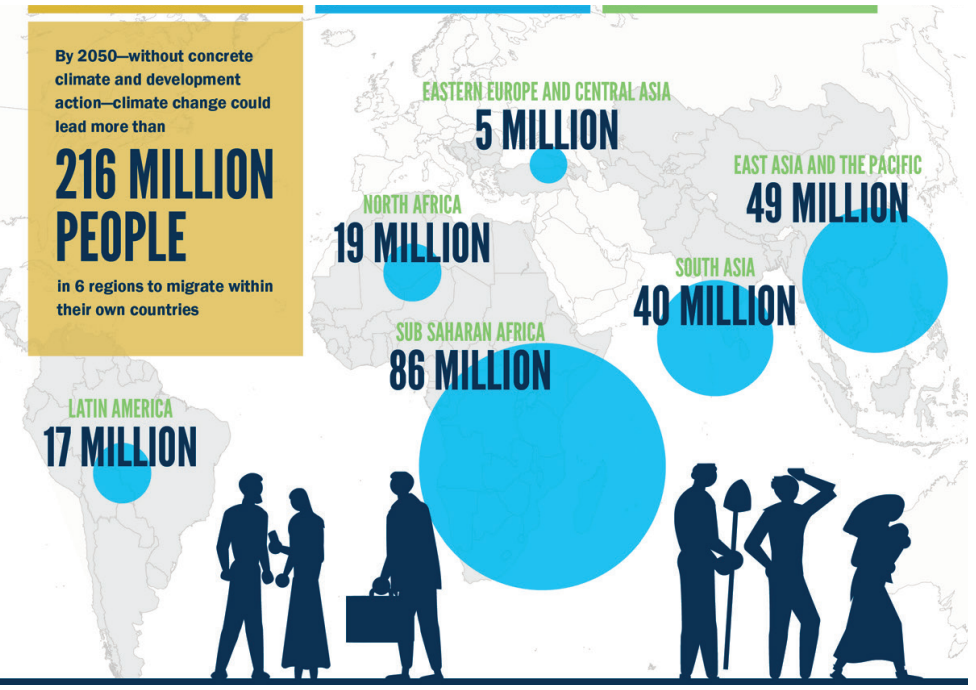 Source: Groundswell Part 2: Acting on Internal Climate Migration48
Source: Groundswell Part 2: Acting on Internal Climate Migration48
When climate change and social structure are considered together, women constitute a group that should be considered with special importance. Women and girls constitute one of the most vulnerable and socially sensitive groups in these developing and fragile countries. Because women constitute a significant portion of the poor, especially in developing countries and communities whose economies are dependent on natural resources, they remain especially vulnerable to the effects of climate change. The responsibilities of women toward people in need of care, such as children and the elderly in the traditional family structure, cause them to take on different and larger responsibilities in addition to their professional roles during disasters and environmental crises.49
Further, women and girls are more exposed to violence and human rights violations in groups forced to migrate due to climate change resource scarcity and conflicts. The results of research, including case studies, reveal a number of differences between the genders in this context.50 To give just one example, according to UN figures, 90 percent of the 140,000 people who died in the cyclone and flood disaster in Bangladesh in 1991 were women.51
Discussions on the status of those who migrate due to the effects of climate change continue. A family of four with two children from Tuvalu Island, located in the middle of the Pacific Ocean, applied for asylum in New Zealand and obtained the right of residence in 2014, igniting the debate in this context.52
In June 2021, Bangladesh Foreign Minister Abul Kalam Abdul Momen announced that the number of Bangladeshi climate refugees displaced due to climate change has exceeded 10 million. Momen stated that his country, currently home to approximately 1.1 million Rohingya Muslims, has been adversely affected by climate change. He stated that it is predicted that more than 30 million people will have to migrate, as the estimated rise in sea level by 2050 will flood 17 percent of Bangladesh’s coasts.53
African and Asian countries’ populations, in particular, migrate due to climate-related problems. Yet, people in some parts of North America and Europe may also have to migrate. Therefore, as the impact of climate change intensifies, it is an important possibility that migration movements from these countries will increase.54
The Relationship between Climate Change, Migration, and International Law
The relationship between migration and climate is included in various international climate change agreements. In UNFCCC studies, the relationship between climate change and migration was included for the first time in the context of the 2010 Cancun Adaptation Framework, in which the importance of cooperation was emphasized.55 The Warsaw International Mechanism (WIM), established in 2013 during COP19, incorporated the identified approaches to mitigate climate change-related damage; human mobility, including migration and displacement, is included in the key strategic workstreams identified.56
Another important UN document that addresses the link between climate change and migration is the UN 2030 Agenda and Sustainable Development Goals (SDGs) adopted in 2015. Goal 10.7 of SDG-10, Reducing Inequalities, includes taking immediate action to tackle climate change and its consequences. One of the goals is to facilitate safe, orderly, and responsible migration.57 The relationship between climate change and migration is also included in the UN’s Sendai Framework for Disaster Risk Reduction 2015-2030. As a result of the UN high-level meeting held in 2016, the New York Declaration for Refugees and Migrants was adopted. Following the New York Declaration, its two pillars, the Global Compact for Refugees (GCR) and the Global Compact for Safe, Orderly, and Regular Migration (GCM), reflect a comprehensive and holistic approach to international migration. The GCM includes recommendations on natural disasters, adverse effects of climate change, and environmental degradation.58 The Paris Agreement is also groundbreaking in its recognition of human rights in a multilateral environmental agreement for the first time. Decision 1/CP.21 regarding the adoption of the Paris Agreement emphasized that the rights of socially sensitive groups –including women, children, the poor, and immigrants– should be addressed, ensuring gender equality, empowering women, and ensuring the principles of intergenerational justice.59
Although the terms climate migrant and climate refugee are often used interchangeably, they are essentially different concepts
In the context of climate change, migration, and human rights, the decision titled “Promotion and Protection of All Human Rights, Civil, Political, Economic, Social and Cultural Rights, Including the Right to Development,” adopted at the 38th session of the UN Human Rights Council in 2018, is also important. The decision emphasizes the relationship between human rights and climate change and states that the negative effects of climate change have a series of consequences, both direct and indirect, on human rights, right to life, right to adequate food, right to physical and mental health, right to access to adequate housing, right to self-determination, right to access to healthy drinking water and treatment, right to work, and right to development.60 In 2020, the UNHRC took an important decision and stated that those who migrate due to the effects of climate change will not be able to be returned (principle of non-refoulment) if there is a possibility that they will not be able to lead their lives with dignity in their country of origin. Within the scope of the decision, it was also stated that the international community should support the country in need due to slow-onset events related to climate change.61
In the UN Convention to Combat Desertification, it was emphasized that the restoration to be carried out in the context of desertification, drought, and land degradation would reduce migration movements, with a focus on slow-onset events. In July 2020, UN General Assembly published a thematic report on internal displacement. In the report, the negative effects of slow-onset events related to climate change are discussed in the context of the human rights of internally displaced persons, and recommendations are made to different stakeholders.62 These recommendations below are in accordance with the recommendations and principles contained in the GCM of the UNFCCC Task Force on Displacement: (i) being human-oriented, (ii) developing international cooperation, (iii) protecting national sovereignty, (iv) rule of law, (v) sustainable development, (vi) protecting human rights, (vii) being gender-sensitive, (viii) being sensitive to children’s rights, (ix) inclusion of migration in all state policies, (x) involvement of the whole society in migration management.63
Today, not only disasters caused by extreme weather events due to climate change, but also slow-onset climate events and disasters have begun to be associated with migration. However, since this relationship is complex and dynamic, it should be considered as a development problem and appropriate policies should be formulated.64 Slow-onset events can cause the ecosystem to suffer so much that it cannot meet critical services. After this stage, loss, and damage begin. Loss of production areas, desertification, rise in sea level, and damage to freshwater resources cause internal or international displacement of people, giving rise to conflicts that in turn pose risks and dangers in terms of both national security and social stability.65 WIM addresses such loss and damage and continues to work in the context of the following approaches:
- Developing knowledge and capacity on comprehensive risk management approaches,
- Strengthening the dialogue-cooperation relationship and synergy among the relevant stakeholders,
- Development of action and support, including finance, technology, and capacity building.66
The Paris Agreement affirmed WIM to prevent and minimize loss and damage, and Article 8 of the Agreement deals with Loss and Damage. According to the Paris Agreement, possible cooperation areas on loss and damage are as follows: (i) early warning systems, (ii) emergency preparedness, (iii) slow-onset events, (iv) events that cause irreversible permanent loss and damage, (v) comprehensive risk assessment and management, (vi) risk insurance, risk pool, and other insurance solutions, (vii) non-economic losses, (viii) resilience of communities, livelihoods, and ecosystems.67
Although climate change adaptation measures are important in reducing loss and damage, according to the Adaptation Gap Report 2021 published by UNEP, the financing required to meet the adaptation needs of developing countries is approximately $280-500 billion and this amount is increasing. Therefore, addressing the financial dimension of loss and damage is also very important.68
As countries grapple with the influx of migrants and refugees, restrictive policies have been introduced to control the flow of undocumented migrants, and international studies linking climate change and migration have increased. At an event held by the UN Network on Migration at COP26 in Glasgow in 2021, the UN invited countries to integrate actions in international documents into their countries’ policies on climate change and to establish cooperation. The UN emphasized that forced migration can be prevented under conditions of adequate climate-finance, and identified the following priority actions:69
- Collecting data on age, gender, and migration status for human mobility analysis and inclusion of migration in national climate change action plans,
- Immigrants are treated in accordance with their human rights and their right to work is respected,
- Planning and implementation of necessary adaptation and mitigation actions in order to eliminate the loss and damage due to climate change,
- Involving young people in national and local climate action and encouraging approaches that are sensitive to human rights, children’s rights, and gender equality; and respect decent work, and active and conscious participation in the policies to be developed,
- Ensuring the security of migration routes for immigrants,
- Ensuring sustainable financing for fragile countries, especially Least Developed Countries and the Small Island States,
- Scaling up the actions in line with the implementation of the recommendations of the Task Force on Displacement created at COP21 as part of the UNFCCC WIM.70
At the point reached today, providing support and establishing cooperation for developing countries has become a priority issue not only for these countries but also for developed countries to protect their national security against migration flows.
Unless measures are taken, climate change is expected to force more than 216 million people from six regions of the world to migrate within their own countries by 2050, which will potentially lead to increasing internal conflicts. ELMUROD USUBALIEV / AA
Climate Change and Security
Security is a concept that has changed and developed considerably in recent times. The phenomenon of security is no longer considered only in the context of military issues and national borders. Today, the unlimited environmental effects of climate change and its consequences in the economic and social context have undoubtedly been effective in changing the perception of security. The climate change crisis comes with consequences that rachet tensions between societies to a higher level. This causes the issue to be handled together with conflict and security. Conflicts accompany the decrease in natural resources due to climate change and pose an additional danger to water and food security. However, it is difficult and will continue to be difficult to directly link any national security event to climate change. Therefore, it would be a more accurate approach to say that although climate change does not cause conflict and security problems on its own, it can be an accelerator of instability and/or violence.71 In the last IPCC (2022) report, this issue was emphasized and it was stated that there was no consensus in the literature on establishing a meaningful relationship between security issues, conflict, and climate change. Furthermore, it has been stated that even if a relationship is established between natural resource crises and the tendency to violence in Syria, Yemen, Iraq, and some parts of Africa, the opposite is also true: conflicts worsen the effects of climate change. It is emphasized that studies on climate change, especially in vulnerable communities affected by these conflicts, cannot be carried out due to poverty, food insecurity, and political instability.72
The security problems caused by climate-related risks are being addressed internationally and the different policy and strategy areas that can be increased in numbers, such as diplomacy, peace and conflict, migration, and disaster risk management, are related to each other. In this context, climate change is described as a threat multiplier in different international documents, especially those of the UN.73
In their study, Burke et al. (2015) examined 55 literature on the concepts of climate and conflict and investigated the connection between conflict sources and civil war, and the damage caused by climate change to natural resources. Accordingly, they conclude that increases in temperature and precipitation systematically increase conflicts.74 Extreme weather events due to climate change, the effect of the COVID-19 pandemic and economic problems have intensified conflicts, especially in developing countries.
Storms, heavy rains, floods, and landslides exacerbated by climate change were the main causes of loss, with 475,000 deaths and financial losses of approximately $2.56 trillion
In 2009, the UN General Assembly requested that UNEP prepare a report on “Climate Change and Its Possible Security Implications.”75 The report states that the security risks arising from climate change should be evaluated within the context of human vulnerability and national security. The risks that climate change will pose in the context of security are discussed under five main headings: (i) vulnerability, (ii) development, (ii) coping and security, (iv) statelessness, and (v) international conflict. In order to ensure climate security and minimize climate-related risks, the recommendation of the report is to carry out adaptation and GHG-mitigation activities, to implement international cooperation and preventive diplomacy, and to conduct research that will enable an understanding of the relationship between climate change and security.76
The issue of international cooperation finds its counterpart in both the UNFCCC and the Paris Agreement in the principle of Common but Differentiated Responsibilities and Respective Capabilities (CBDR-RC). Accordingly, measures regarding climate change will be integrated with economic and social development. The special needs of developing country parties, especially those most vulnerable to the negative effects of climate change, will be taken into account. Developed countries have historical responsibilities in the context of climate change; in line with the provision of climate justice, developed countries are obliged to provide financial, capacity-building, and technology transfer support to developing countries.77
Impending Crises
In November 2021, up to 283 million people in 80 countries were declared by the WFP as experiencing or being at high risk of acute food insecurity. Famine-like conditions remain a real possibility in 43 countries, and 45 million people have been identified as facing an emergency or catastrophic acute food insecurity.78 Similarly, UNFCCC underlined that there are problems in ensuring food security in the face of the effects of climate change.79 Today, Southeast Asia is in a position to cause potential refugee crises. Major crises in Afghanistan, Myanmar, and Somalia have already resulted from conflicts, economic crises, and extreme weather events.80
Melting regions of the Arctic create another potential crisis area between leading countries such as Russia and China. The positive environment that has prevailed under the Arctic Council and other multilateral mechanisms are likely to erode as new shipping and trade routes are opened; with increasing temperatures reducing sea ice and decreasing the high costs and risks involved in commercial activities, new countries will come to the region with the demand to operate.81 Indeed, economic activity is one of the main areas where climate change can cause security problems.
The Paris Agreement is also groundbreaking in its recognition of human rights in a multilateral environmental agreement for the first time
The IPCC’s 1.5°C Global Warming Report emphasizes that the increase in global average temperature will affect sustainable development, and it will be difficult to fight against poverty and ensure energy security. Human health is another important concern in the context of security (and beyond); the report cites deaths due to air pollution, extreme heat, heat waves, and depletion of the ozone layer. In addition, the importance of climate change adaptation actions in the context of public health is emphasized, as is the risk of the geographical displacement of vector-borne diseases due to temperature increases (Figure 7).82
Figure 7. The Risk of Infectious Diseases that Human Mobility Will Increase
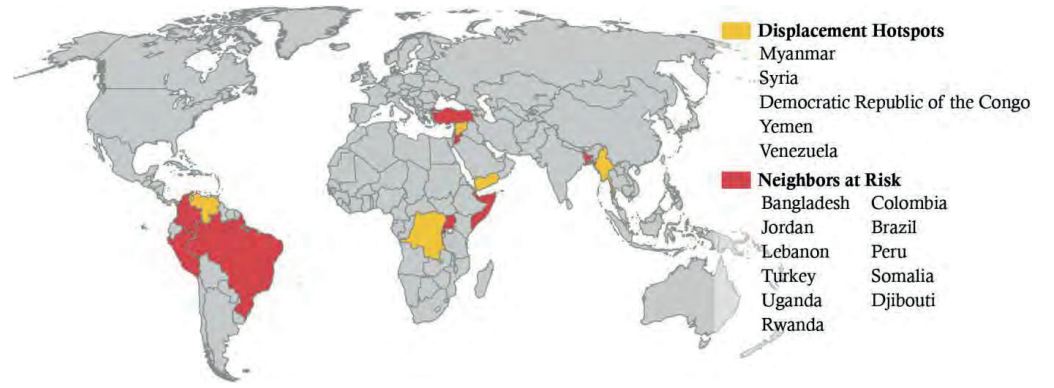 Source: Worldwide Threat Assessment of the US Intelligence Community83
Source: Worldwide Threat Assessment of the US Intelligence Community83
Another area where climate change will create security problems is the damage to national security systems. When Hurricane Michael hit the Florida coast in October 2018, Tyndall Air Force Base, which also houses the Florida Air National Guard, its facilities, equipment, and aircraft, was damaged. A report prepared by the U.S. Department of Defense in January 2019 states that U.S. military facilities are mostly located in areas at high risk due to climate change: 53 of them are facing recurrent risks from floods, 43 from drought, and 36 from forest fires.84
Turkey is located in the Mediterranean Basin, one of the regions that will be most affected by climate change in the coming years
Turkey, Climate Change, and Migration
Climate Projections for the Region
Turkey is located in the Mediterranean Basin, one of the regions that will be most affected by climate change in the coming years.85 According to projections made by the General Directorate of Meteorology (GDoM) for Turkey based on IPCC scenarios, it has been determined that the temperature will increase by 2-3oC until 2100; consecutive dry days will increase, and precipitation will decrease significantly, according to the results of all scenarios. These findings were communicated to the UNFCCC Secretariat under the 7th National Communication on Climate Change.86
Figure 8. Temperature and Precipitation Projections for Turkey, (2041-2099)
(HadGEM2-ES RCP4.5-20 km)

Source: Turkey’s 7th National Communication87
The IPCC’s determinations in the AR6-WGI Report regarding the European Region and the Mediterranean Basin, including Turkey, are in line with the findings of the GDoM. According to their projections, in the European Region, where Turkey is located, it is predicted that the temperatures will increase gradually in different warming scenarios of 1.5, 2, and 4oC.88 These scenarios are illustrated in Figure 9.
Today, not only disasters caused by extreme weather events due to climate change, but also slow-onset climate events and disasters have begun to be associated with migration
Figure 9. Projected Changes in Temperature and Precipitation in Europe
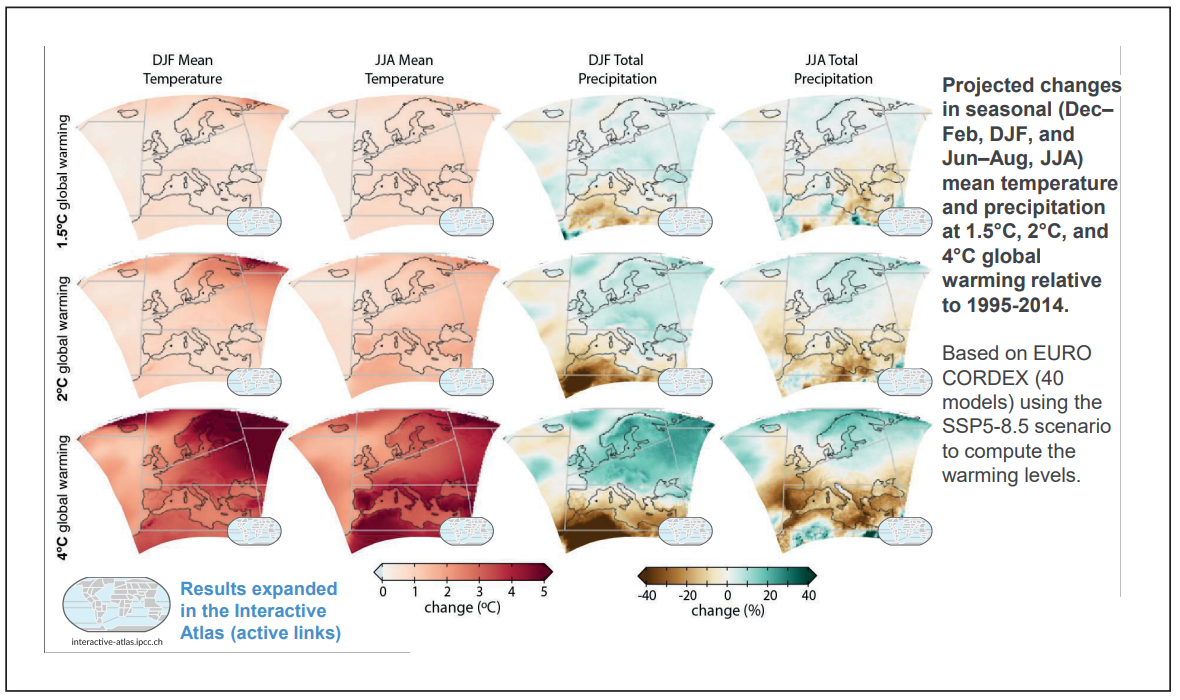 Source: IPCC Climate Change 202189
Source: IPCC Climate Change 202189
The IPCC has also stated that the rise in sea level in the Mediterranean Region will be close to or faster than the global average, and hydrological, agricultural, and ecological drought there is predicted to increase. In addition, the risk of barrenness and fire will increase in the Mediterranean Region due to temperature increases of 2°C and above.90 The agricultural sector and water resources are among the areas that will be most affected by the conditions related to climate change in Turkey.
Migration Trends
Turkey is particularly vulnerable to human mobility due to its geographical location, social structure, history, proximity, and economic conditions. Turkey is located close to Europe, which is the preferred destination for immigrants and where approximately 86.7 million immigrants already live (7.9 percent of the global immigrant population). The Eastern Mediterranean route, which is one of the two routes where the highest numbers of irregular migrants are recorded in transit to Europe, stretches from Turkey to Greece91. According to the World Migration Report 2020 prepared by IOM, the Syria-Turkey corridor is among the largest corridor with the arrival of more than 3.7 million Syrian refugees in Turkey in 2019.92
Conflicts accompany the decrease in natural resources due to climate change and pose additional danger to water and food security
It should not be forgotten that there may be many different reasons underlying these migration movements. Immigrants coming to Turkey may come not only because of the effects of conflict or climate change but also because of historical or cultural ties. For example, many immigrants from Central Asia come to Turkey to find jobs (Figure 10).93 In addition, due to the fact that Turkey is a transit country between sending and receiving states, some immigrants remain in Turkey when unable to proceed toward their target destination.
Figure 10. The 20 Largest Migration Corridors from Asian Countries in 2019
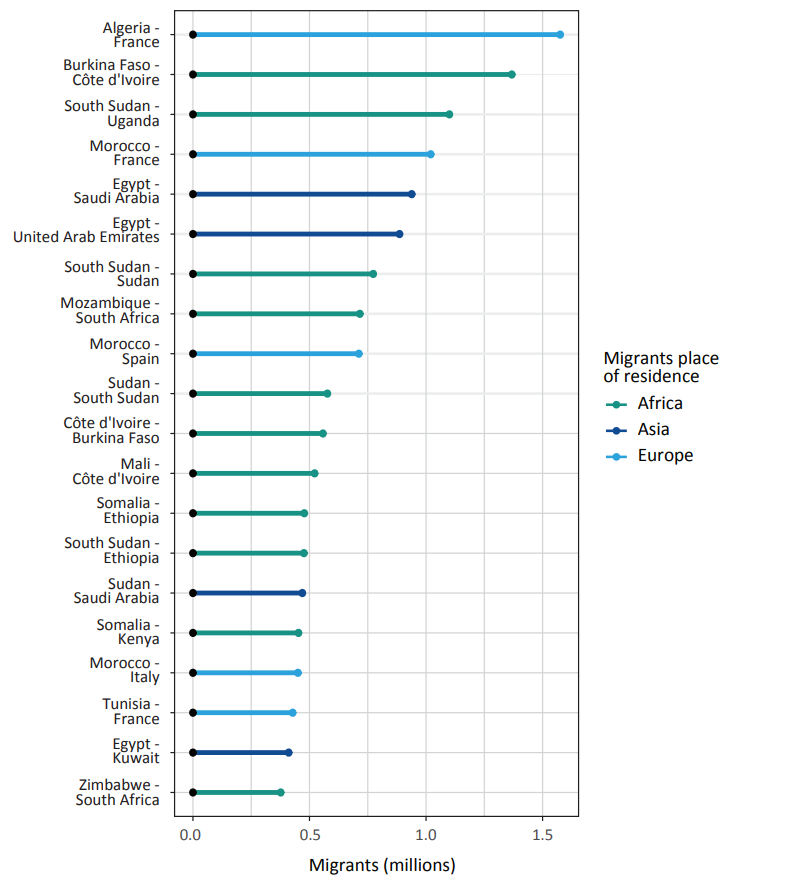
Source: World Migration Report 202094
As of August 2021, Afghanistan is the country with the highest number of irregular migrants residing in Turkey. The drought had affected 80 percent of Afghanistan by 2021. However, drought is not the only reason for Afghan migration; the increase in the conflict caused by the advance of the Taliban is also a significant cause.
Considering the impact of tropical storms, heavy rains, floods, and droughts on migration movements to Turkey alongside current migration patterns, future migration to Turkey is expected to occur from South Asia, the Balkans, the Black Sea, and the Middle East.95
As a developing country, the fight against climate change is of critical importance for Turkey. After Turkey’s ratification of the Paris Agreement, President Recep Tayyip Erdoğan announced the 2053 net-zero carbon and green development policy target. The negative effects of climate change and the security and migration problems it causes should be taken into account, along with other issues, in the realization of this goal and policy. Accordingly, in Turkey’s 11th Development Plan (2019-2023), migration is addressed as a phenomenon that needs to be managed well. As targeted in the Plan, it is critical to analyze potential migration movements toward Turkey. Ensuring the social integration of immigrants in Turkey, especially Syrian immigrants, is another topic that should be seriously addressed,96 as Turkey already hosts a large proportion of immigrants from Syria.
Migration movements to Turkey have developed and gradually increased in recent years due to climate change, among other factors, and are likely to accelerate in the future
Turkey is a party to the 1951 Refugee Convention and its 1967 Protocol and accepts its definition of “refugee” with its temporal limitation removed but its geographical limitation in place.97 Accordingly, Turkey does not consider immigrants outside of European countries as refugees. When immigration to Turkey in the context of European and non-European immigration is evaluated in a legal sense, it should be emphasized that some protection statuses are granted to immigrants outside Europe under the Law on Foreigners and International Protection No. 6458, but they are not defined as refugees. According to this law, persons coming from outside European countries may be legally defined as climate migrants, climate asylum-seekers, or displaced persons instead of climate refugees.98
Migration movements to Turkey have developed and gradually increased in recent years due to climate change, among other factors, and are likely to accelerate in the future. In today’s conditions, where the issue of climate migration is increasing in importance on the international agenda, it is critical to consider migration management together with the effects of climate change. Indeed, it is inevitable that these migrations will have further, significant effects across environmental, economic, and social dimensions in Turkey, and more studies are needed to assess and address the impact of these effects. The highest-level indicator of the importance given to climate and migration events in Turkey is the establishment of the Climate Change Presidency and Migration Management Presidency by means of Presidential Decree No. 85 in October 2021.99 This decree indicates the administration’s willingness to develop and implement policies, strategies, and practices in the most appropriate way. Evaluating and addressing climate change and migration, which unfold in different ways in Turkey, together with the risks they pose, are essential for Turkey’s present and future.
Conclusion
The negative effects of climate change have begun to be seen and felt all over the world. Research conducted by the IPCC indicates that these effects will be felt even more widely, more severely, and more rapidly in the future. Developing countries suffer the most from these effects, and are faced with many environmental, social, and economic consequences that exacerbate efforts to establish sustainable economic development, ensure water and food security and address national security problems. This situation is an important contributing factor in initiating conflict and international migration in developing countries. In order to prevent this, it is essential for countries to join together globally to develop strong communication and cooperation.
The negative effects of climate change have begun to be seen and felt all over the world
Studies conducted by the UNHRC and based on the scientific findings of the IPCC reveal that the realization of human rights will be hindered due to climate change. Since the consequences of climate change do not affect countries equally, the solutions to be created must also comply with the CBDR-RC principle. Cooperation between countries should support the realization of the right to life, the right of access to adequate food, water, adequate health opportunities, education, and shelter, as well as the right to self-realization in line with the fulfillment of all human rights. Ensuring the concept of human dignity, which is referred to in almost all UN documents, should be a basic tenet of every approach to the climate change migration nexus for both, present and future generations.
In the approach to migration events related to climate change, it is necessary to be human-oriented; develop international cooperation; protect national sovereignty, human rights, and the rule of law; be sensitive to children’s rights, gender equality, and sustainable development; and prepare the policies to be developed with an integrated approach.
In the words of former UN High Commissioner for Refugees and current UN Secretary-General António Guterres:
Our world today is at a crossroads. From a humanitarian perspective, this juncture is defined by two “mega-problems:” a seemingly uncontrollable multiplication of violent conflicts in an environment of global insecurity, and the pervasive and growing effects of natural hazards and climate change that are already shaping our present and will shape our future even more.100
Endnotes
1. “Guterres: The IPCC Report Is a Code Red for Humanity,” UN, (August 9, 2021), retrieved December 20, 2021, from https://unric.org/en/guterres-the-ipcc-report-is-a-code-red-for-humanity/.
2. “The Paris Agreement,” UNFCCC, (December 12, 2015), retrieved December 10, 2021, from https://unfccc.int/sites/default/files/english_paris_agreement.pdf.
3. “Understanding the Climate-Conflict Nexus from a Humanitarian Perspective: A New Quantitative Approach,” UNOCHA, (2016), retrieved from https://www.unocha.org/sites/unocha/files/Understanding%20the%20climate-conflict%20nexus.pdf, p. 6.
4. “IPCC Climate Change 2014: Synthesis Report, Contribution of Working Groups I, II and III to the Fifth Assessment Report,” IPCC, (2014), retrieved from https://www.ipcc.ch/site/assets/uploads/2018/02/SYR_AR5_FINAL_full.pdf.
5. The reports of the UN Disaster Risk Reduction Office (UNDRR) support this finding.
6. “The Human Cost of Disasters: An Overview of the Last 20 Years, 2000-2019,” UNDRR and CRED, (2020), retrieved from https://reliefweb.int/sites/reliefweb.int/files/resources/Human%20Cost%20of%20Disasters%202000-2019%20Report%20-%20UN%20Office%20for%20Disaster%20Risk%20Reduction.pdf, p.8.
7. “The Global Risks Report 2021,” WEF, (2021), retrieved from https://www3.weforum.org/docs/WEF_The_Global_Risks_Report_2021. pdf, p. 12.
8. David Eckstein, Vera Künzel, and Laura Schäfer, “Global Climate Risk Index 2021,” Germanwatch, (2021), retrieved from https://germanwatch.org/sites/germanwatch.org/files/Global%20Climate%20Risk%20Index%202021_1.pdf, p. 8.
9. “IPCC Climate Change 2021: The Physical Science Basis. Contribution of Working Group I to the Sixth Assessment Report,” IPCC-WGI, (2021), retrieved from https://www.ipcc.ch/report/ar6/wg1/.
10. “Guterres.”
11. “Glasgow’s 2030 Credibility Gap: Net Zero’s Lip Service to Climate Action,” CAT, (November 11, 2021), retrieved December 21, 2021, from https://climateactiontracker.org/publications/glasgows-2030-credibility-gap-net-zeros-lip-service-to-climate-action/.
12. “Nationally Determined Contributions under the Paris Agreement Revised Synthesis Report,” UNFCCC, (2021), retrieved from https://unfccc.int/sites/default/files/resource/cma2021_08r01_E.pdf, p. 5.
13. “Understanding the Climate-Conflict Nexus from a Humanitarian Perspective,” p. 6.
14. Etienne Piguet, Antoine Pécoud, and Paul de Guchteneire, “Migration and Climate Change: An Overview,” Refugee Survey Quarterly, Vol. 33, No. 3 (2011), pp. 1-23.
15. “IPCC Climate Change 2022: Impacts, Adaptation and Vulnerability Report-Summary for Policymakers,” IPCC, (2022) retrieved from https://report.ipcc.ch/ar6wg2/pdf/IPCC_AR6_WGII_SummaryForPolicymakers.pdf.
16. “Global Report on Internal Displacement 2020,” IDMC, (2020), retrieved from https://www.internal-displacement.org/sites/default/files/publications/documents/2020-IDMC-GRID.pdf; John Podesta, “The Climate Crisis, Migration, and Refugees,” Brookings, (July 25, 2019), retrieved December 15, 2021, from https://www.brookings.edu/research/the-climate-crisis-migration-and-refugees/.
17. “World Migration Report 2022,” IOM, (2021), retrieved from https://publications.iom.int/books/world-migration-report-2022, p. xii.
18. “Understanding the Climate-Conflict Nexus from a Humanitarian Perspective,” p. 12.
19. “Migration in the World,” IOM, (March 12, 2021), retrieved December 3, 2021, from https://www.iom.sk/en/migration/migration-in-the-world.html.
20. “United Nations Framework Convention on Climate Change”, UNFCCC, (1992), retrieved December 10, 2021, from https://unfccc.int/sites/default/files/convention_text_with_annexes_english_for_posting.pdf.
21. “Annex II: Glossary,” in Katherine March, Serge Planton, and Christoph von Stechow (eds.), IPCC AR5 Climate Change 2014: Synthesis Report, (Geneva: IPCC, 2014), pp. 117-130.
22. Emma Tompkins and Neil Adger, “Defining Response Capacity to Enhance Climate Change Policy,” Environmental Science and Policy, Vol. 8, No. 6 (October 2005), pp. 562-571.
23. “AR5 Climate Change 2014: Mitigation of Climate Change. Contribution of Working Group III to the Fifth Assessment Report,” IPCC, (2014), retrieved from https://www.ipcc.ch/site/assets/uploads/2018/02/ipcc_wg3_ar5_full.pdf, p. 1009.
24. “IPCC Special Report: Global Warming of 1.5 OC,” IPCC, (2018), retrieved from https://www.ipcc.ch/sr15/.
25. “AR5 Climate Change 2014,” p. 2.
26. Podesta, “The Climate Crisis, Migration, and Refugees;” “Loss and Damage Online Guide,” UNFCCC, (June 2021), retrieved from https://unfccc.int/sites/default/files/resource/Online_Guide_June_2021.pdf, p. 3.
27. Marshall Burke, Solomon M. Hsiang, and Edward Miguel, “Climate and Conflict,” Annual Review of Economics, Vol. 7, No. 1 (2015), pp. 577-617.
28. “Loss and Damage Online Guide,” UNFCCC, retrieved from https://unfccc.int/files/adaptation/groups_committees/loss_and_damage_executive_committee/application/pdf/online_guide.pdf, p. 4.
29. “Annual Review 2020,” WFP, (2020), retrieved from https://www.wfp.org/publications/annual-review-, p. 14.
30. Maria Jullia Trombetta, “The Meaning and Function of Climate Security”, 2nd WISC Conference, Ljubljana, (July 23-26, 2008); Lisa M. Dellmuth, Maria T. Gustafsson, Niklas Bremberg, and Malin Mobjörk, “Intergovernmental Organizations and Climate Security: Advancing the Research Agenda,” WIREs Climate Change, Wiley Periodicals, Inc, Vol. 9, No. 1 (2018), pp. 1-13.
31. Glossary of Migration, p. 32.
32. Glossary of Migration, p. 31.
33. “Climate Change Is a Key Driver of Migration and Food Insecurity,” UNFCCC, (October 16, 2017), retrieved December 14, 2021, from https://unfccc.int/news/climate-change-is-a-key-driver-of-migration-and-food-insecurity.
34. “World Migration Report 2022,” IOM, retrieved from https://publications.iom.int/books/world-migration-report-2022, p. 3.
35. Glossary of Migration, p. 32.
36. “World Migration Report 2022,” p. 379.
37. “World Migration Report 2022.”
38. “World Migration Report 2022,” p. 4.
39. “The Refugee Convention, 1951,” (July 25, 1951), retrieved December 10, 2021, from https://www.unhcr.org/3b66c2aa10.
40. “IPCC Climate Change 2022: Impacts, Adaptation and Vulnerability Report,” IPCC; Neva Övünç Öztürk, “İklim Mülteciliği Kavramının Hukuki Görünümü: Mevcut Koruma Araçlarının Değerlendirilmesi ve Çözüm Önerileri,” TESEV, (2021), retrieved from https://www.tesev.org.tr/wp-content/uploads/rapor_gorsel_iklim_multeciligi_kavraminin_hukuki_gorunumu_mevcut_araclarin_degerlendirilmesi_ve_cozum_onerileri.pdf.
41. “Understanding the Climate-Conflict Nexus from a Humanitarian Perspective.”
42. “Summary for Policymakers,” in Christopher B. Field, Vicente R. Barros, Katharine J. Mach, and Michael D. Mastrandre (eds.), IPCC AR5 Climate Change 2014: Impacts, Adaptation, and Vulnerability, WGII Contribution (Geneva: IPCC, 2014), pp. 3-30; “IPCC Special Report,” IPCC.
43. Eckstein et al., “Global Climate Risk Index 2021,” p. 8.
44. Eckstein, et al., “Global Climate Risk Index 2021,” p. 8.
45. “The Climate Crisis Is a Threat to National Security,” CRP, (December 9, 2019), retrieved December 9, 2021, from https://www.climaterealityproject.org/blog/climate-crisis-threat-national-security; “No Matter of Choice: Displacement in a Changing Climate,” IDMC, (2018), retrieved from https://www.internal-displacement.org/sites/default/files/publications/documents/20181213-slow-onset-intro.pdf, p. 7.
46. “No Matter of Choice,” p. 7.
47. Viviane Clement, Kanta Kumari Rigaud, Alex de Sherbinin, Bryan Jones, Susana Adamo, Jacob Schewe, Nian Sadiq, and Elham Shabahat, “Groundswell Part 2: Acting on Internal Climate Migration,” The World Bank, (2021), retrieved from file:///C:/Users/User/Downloads/Groundswell%20Part%20II.pdf.
48. Clement et al., “Groundswell Part 2,” p. xv.
49. Balgis Osman-Elasha, “Women in the Shadow of Climate Change,” UN, (2021), retrieved December 12, 2021, from https://www.un.org/en/chronicle/article/womenin-shadow-climate-change.
50. Rasheda Begum, “Women in Environmental Disasters: The 1991 Cyclone in Bangladesh,” Focus on Gender, Vol. 1, No. 1 (February 1993), pp. 34-39.
51. Keiko İkeda, “Gender Difference in Human Loss and Vulnerability in Natural Disasters: A Case Study from Bangladesh,” Indian Journal of Gender Studies, Vol. 2, No. 2 (1995), pp. 171-193.
52. “In re: AD (Tuvalu) (Immigration and Protection Tribunal New Zealand, 2014),” Climate Law, (2014), retrieved December 15, 2021, from https://climate-laws.org/geographies/new-zealand/litigation_cases/in-re-ad-tuvalu-immigration-and-protection-tribunal-new-zealand-2014.
53. “Bangladeş Dışişleri Bakanı Momen: Rohingya Krizinin Kalıcı Şekilde Çözülmesi Gerekiyor,” Anadolu Ajanısı, (June 27, 2021); “Bangladesh-A Nation en Route to Development,” Diplomat Magazine, (September 18, 2021).
54. “World Migration Report 2020,” IOM, (2020), retrieved from https://publications.iom.int/books/world-migration-report-2020-chapter-3; Rafael Reuveny, “Climate Change Induced Migration and Violent Conflict,” Political Geography, Vol. 26, No. 6 (August 2007), pp. 656-673.
55. “Mapping Human Mobility (Migration, Displacement and Planned Relocation) and Climate Change in International Processes, Policies and Legal Frameworks,” IOM, (2018), retrieved from https://unfccc.int/sites/default/files/resource/WIM%20TFD%20II.2%20Output.pdf.
56. “Five-Year Rolling Workplan of the Executive Committee of the Warsaw International Mechanism for Loss and Damage Associated with Climate Change Impacts,” UNFCCC, (2020), retrieved from https://unfccc.int/sites/default/files/resource/5yr_rolling_workplan.pdf.
57. “The 17 Goals,” UN-SDG, (2015), retrieved December 12, 2021, from https://sdgs.un.org/goals.
58. “Global Compact for Safe, Orderly and Regular Migration,” UNFCCC, (July 13, 2018), retrieved December 8, 2021, from https://refugeesmigrants.un.org/sites/default/files/180713_agreed_outcome_global_compact_for_migration.pdf.
59. “Decisions Adopted by the Conference of the Parties,” UNFCCC, (January 29, 2016), retrieved December 9, 2021, from https://unfccc.int/resource/docs/2015/cop21/eng/10a01.pdf, p. 2.
60. “Promotion and Protection of All Human Rights, Civil, Political, Economic, Social and Cultural Rights, Including the Right to Development (A/HRC/38/L.5),” UNHRC, (July 2, 2018), retrieved December 10, 2021, from https://undocs.org/A/HRC/38/L.5.
61. “World Migration Report 2022,” p. 380
62. “World Migration Report 2022,” p. 380
63. “Global Compact for Safe, Orderly and Regular Migration.”
64. Benoit Mayer, “Migration in the UNFCCC Workstream on Loss and Damage: An Assessment of Alternative Framings and Conceivable Responses,” Transnational Environmental Law, Vol. 6, No. 1 (March 2017), pp. 107-129.
65. Eckstein et al., “Global Climate Risk Index 2021,” p. 23; “No Matter of Choice,” p. 7.
66. “Loss and Damage: The Role of Ecosystem Services,” UNEP, (2016), retrieved from https://uneplive.unep.org/media/docs/assessments/loss_and_damage.pdf, p. 1; “Loss and Damage Online Guide,” UNFCCC.
67. Sarah Louisa Nash, “The Devil’s in the Detail: Policymaking on Climate Change and Human Mobility in the UNFCCC,” IPC, (May 2017), retrieved from https://ipc.sabanciuniv.edu/Content/Images/CKeditorImages/20200313-11031528.pdf; “Task Force on Displacement,” UNFCCC (2021) retrieved December 2, 2021, from https://unfccc.int/process/bodies/constituted-bodies/WIMExCom/TFD#eq-1.
68. “Adaptation Gap Report 2021: The Gathering Storm: Adapting to Climate Change in a Post-Pandemic World,” UNEP, (2021), retrieved from https://www.unep.org/resources/adaptation-gap-report-2021.
69. “Migration Scenarios in a Changing Climate: Building Resilient Communities Is Needed Now More than Ever,” UNNoM, (October 29, 2021), retrieved December 3, 2021, from https://migrationnetwork.un.org/statements/migration-scenarios-changing-climate-building-resilient-communities-needed-now-more-ever.
70. “Task Force on Displacement.”
71. “The Climate Crisis Is a Threat to National Security,” CRP; Michelle Melton, “Climate Change and National Security, Part I: What Is the Threat, When’s It Coming, and How Bad Will It Be?” (November 19, 2018), retrieved December 1, 2021, from https://www.lawfareblog.com/climate-change-and-national-security-part-i-what-threat-whens-it-coming-and-how-bad-will-it-be.
72. “IPCC Climate Change 2022,”
73. Dellmuth, et al., “Intergovernmental Organizations and Climate Security;” Dan Smith, Malin Mobjörk, Florian Krampe, and Karolina Eklöw, “Climate Security Making It #Doable,” The Clingendael Institute, (2019), retrieved from https://www.clingendael.org/sites/default/files/2019-02/Climate_Security_Makingit%23doable_0.pdf, p. 16.
74. Burke et al., “Climate and Conflict,” p. 577.
75. Smith et al., “Climate Security Making It #Doable,” p. 16; Ulrika Modéer, “Why Does the UN Focus on Climate-Related Security Risks?” UNDP, (February 20, 2019), retrieved December 16, 2021, from https://www.undp.org/blog/why-does-un-focus-climate-related-security-risks.
76. “Climate Change and Its Possible Security Implications,” UNSG, (2009), retrieved from https://www.unhcr.org/protection/environment/543e73f69/climate-change-its-possible-security-implications-report-secretary-general.html.
77. Osman Balaban, Busen Özgür, and Begüm Sakar, İklim Değişikliği, Göç ve Yerel Yönetimler, (Ankara: RESLOG), p. 28; “The Paris Agreement;” UNFCCC, “United Nations Framework Convention on Climate Change.”
78. “WFP Global Operational Response Plan 2021,” WFP, (2021), retrieved from https://docs.wfp.org/api/documents/WFP-0000133818/download/?_ga=2.53948970.305043541.1640437154-1544946136.
1640437154&_gac=1.18071883.1640437161.CjwKCAiAn5uOBhADEiwA_pZwcHIbEa_LNS_YkzRlfyXwbb-aYRtM5DOlW9jOhWr3eFHxk3IFO8KZqhoCgg4QAvD_BwE, p. 5.
79. “Climate Change Is a Key Driver of Migration and Food Insecurity.”
80. “WFP Global Operational Response Plan 2021,” p. 5.
81. Daniel R. Coats, “Worldwide Threat Assessment of the US Intelligence Community,” US-ODNI, (2019), retrieved from https://www.dni.gov/files/ODNI/documents/2019-ATA-SFR---SSCI.pdf, p. 23; “Understanding the Climate-Conflict Nexus from a Humanitarian Perspective,” p. 9; Bruce Lieberman, “A Brief Introduction to Climate Change and National Security,” Yale Climate Connection, (July 23, 2019), retrieved December 14, 2021, from https://yaleclimateconnections.org/2019/07/a-brief-introduction-to-climate-change-and-national-security/.
82. “IPCC Special Report,” IPCC, pp. 95, 97, 180.
83. Coats, “Worldwide Threat Assessment of the US Intellıgence Community,” p. 22.
84. “Report on Effects of a Changing Climate to the Department of Defense,” US-DoD, (2019), retrieved from https://partner-mco-archive.s3.amazonaws.com/client_files/1547826612.pdf.
85. Esra Pekin Albayrakoğlu, “Climate Change and Security: The Case for Turkey,” Gazi Akademik Bakış, 5, No. 9 (Winter 2011), pp. 59-75. See also, IPCC reports.
86. “Turkey’s 7th National Communication,” MoEU, (2018), retrieved from https://unfccc.int/sites/default/files/resource/496715_Turkey-NC7-1-7th%20National%20Communication%20of%20Turkey.pdf, p. 134.
87. “Turkey’s 7th National Communication,” p. 134.
88. “IPCC Climate Change 2021.”
89. “IPCC Climate Change 2021.”
90. “IPCC Climate Change 2021.”
91. “World Migration Report 2020,” p. 91.
92. “World Migration Report 2020,” p. 69.
93. “World Migration Report 2020,” p. 79; “11. Kalkınma Planı-Dış Göç Özel İhtisas Komisyonu Raporu,” Kalkınma Bakanlığı, (2018), retrieved from https://www.sbb.gov.tr/wp-content/uploads/2020/04/DisGocPolitikas%C4%B1OzelIhtisasKomisyonuRaporu.pdf.
94. “World Migration Report 2020.”
95. “World Migration Report 2020,” p. 70; “Düzensiz Göç,” Göç İdaresi Başkanlığı, (December 23, 2021), retrieved December 23, 2021, from https://www.goc.gov.tr/duzensiz-goc-istatistikler.
96. Souad Osseiran and Ayşegül Güneyli, “FMRC Series Bibliographies on Syrian Refugees in Turkey: Social Integration Report,” MiReKoc Working Papers, (2020), retrieved from https://mirekoc.ku.edu.tr/wp-content/uploads/2020/08/MiReKoc-Working-Papers_F%C4%B1nalV1.pdf, p. 5; Ahmet İçduygu and Doğuş Şimşek, “Syrian Refugees in Turkey: Towards Integration Policies,” Turkish Policy Quarterly, 15, No. 3, pp. 59-69.
97. Nuray Ekşi, “İklim Mültecileri,” Göç Araştırmaları Dergisi, Vol. 2, No. 2 (Temmuz-Aralık 2016), pp. 10-58; “Submission by the United Nations High Commissioner for Refugees (UNHCR), for the Office of the High Commissioner for Human Rights’ Compilation Report – Universal Periodic Review: The Republic of Turkey,” UNHRC, (2020), retrieved from https://www.refworld.org/docid/5541e6694.html; “Türkiye, 65 Yıl Önce İmzalanan Cenevre Mülteci Sözleşmesi’ne Koyduğu Sınırlamayı Kaldırmalıdır,” Uluslararası Af Örgütü Türkiye Şubesi, (2016), retrieved from https://www.amnesty.org.tr/icerik/turkiye-65-yil-once-imzalanan-cenevre-multeci-sozlesmesine-koydugu-sinirlamayi-kaldirmalidir#.
98. Neva Övünç Öztürk, “İklim Mülteciliği Kavramının Hukuki Görünümü: Mevcut Koruma Araçlarının Değerlendirilmesi ve Çözüm Önerileri,” TESEV; “Yabancılar ve Uluslararası Koruma Kanunu,” (April 4, 2013), retrieved December 5, 2021, from https://mevzuat.gov.tr/mevzuatmetin/1.5.6458.pdf.
99. Published in the Official Gazette, (October 29, 2021), and numbered 31643.
100. “Understanding the Climate-Conflict Nexus from a Humanitarian Perspective,” p. 26.


